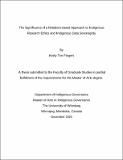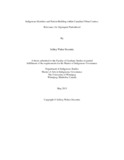The Significance of a Relations-based Approach to Indigenous Research Ethics and Indigenous Data Sovereignty
Metadata
Afficher la notice complèteAuthor
Ten Fingers, Keely
Date
2020-12-08Citation
Ten Fingers, Keely. The Significance of a Relations-based Approach to Indigenous Research Ethics and Indigenous Data Sovereignty; A thesis submitted to the Faculty of Graduate Studies in partial fulfilment of the requirements for the Master of Arts degree, Department of Indigenous Governance, Master of Arts in Indigenous Governance. Winnipeg, Manitoba, Canada: The University of Winnipeg, December 2020. DOI: 10.36939/ir.202012181310.
Abstract
BACKGROUND: Indigenous people have been increasingly asserting self-determination in research to “research ourselves back to life”. There is a current knowledge gap regarding how gender is considered in Indigenous research ethics and its implications for Indigenous self-determination in research. METHODS: Utilizing critical discourse analysis and a decolonizing theoretical framework a systematic review was conducted to contribute to filling this knowledge gap. RESULTS: The dominant concept and language of gender as binary are being used in Indigenous research conducted in observance of Indigenous research and it is given significance through its continued use, particularly in relation to participant sampling and bias. The mainstream concept is also given significance because research involving Indigenous people is in response to inequities resulting from colonization. However, there is resistance to this concept and its significance by revitalizing and renewing Indigenous Ways of Knowing (research paradigms including epistemology, methodology, methods, and theories) such as language and most significantly, elevating relations (human-to-human and human-to-nature) as part of Indigenous Ways of Being (ontology). The implications of this recovery and renewal is alignment and strengthening of Indigenous Data Sovereignty. This is ethical Indigenous research. CONCLUSION: “Researching ourselves back to life” involves going back to the very beginning, to our very being as Indigenous peoples and relating this to how we understand, conduct, and utilize ethical research to express and reflect our reality for wellness, governance, and nation-(re)building.
Collections
Related items
Showing items related by title, author, creator and subject.
-
Indigenous Identities and Nation-Building within Canadian Urban Centres: Relevance for Algonquin Nationhood
Decontie, Jeffrey (University of WinnipegUniversity of Winnipeg, 2013-06-03)I document and analyze, using a decolonization framework, historical and contemporary understandings of Indigenous identities, focusing primarily on Indigenous Canadian identity in urban centres. I describe the reconstruction ... -
Nii Ndahlohke
McCallum, Mary Jane Logan; Tucker, Julie Rae (Mary Jane Logan McCallum, 2024)This catalogue of the Nii Ndahlohke exhibition at Art Windsor Essex (September 26, 2023 – June 25, 2024) features work by First Nations artists exploring the history of forced labour of students at Mount Elgin Industrial ... -
Unheard Voices: Healing Stories of Reclamation and Rebuilding for Families of Missing and Murdered Indigenous Women, Girls, and Two-Spirit people who have not been involved in the National Inquiry
Wolfe, Tammy (University of WinnipegUniversity of Winnipeg, 2021)This work uncovers the stories of relatives who have been impacted by the crisis of Missing and Murdered Indigenous Women, Girls, and Two-Spirit people (MMIWG2S) in Canada, who have not been involved in the National Inquiry ...




